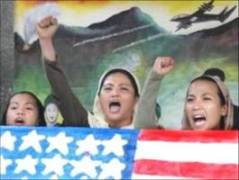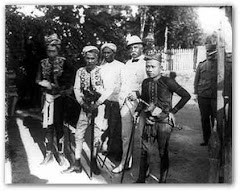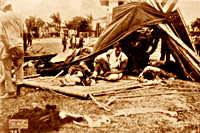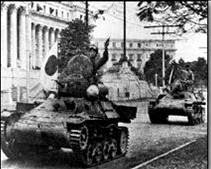



" '...what is the best type of Jihad [struggle].' He answered: 'Speaking truth before a tyrannical ruler.' " - Hadeth Al-Sharef, Riyadh us Saleheen, Volume 1:195
Press Release
December 10, 2007
Bai Ali Indayla, the group’s national secretary-general said, “Despite various agreements and declarations on human rights around the world, violations continue to persist and the Bangsamoro people were not spared to such abuses.”
“Under
According to KAWAGIB, a Moro human rights organization, 21cases of human rights violations committed by the Philippine military, police and intelligence agents against the Moro people from January to November 2007 alone. These include violation of civil and political rights, violation of right to life and violation against property.
On the same period, more than 75,000 Moro civilians have been displaced in Basilan, Sulu and Midsayap,
Basilan was hit on July because of a false report that kidnapped victim Fr. Giancarlo Bossi was seen in an MILF territory in Basilan. Elements of the Philippine Marines under the Task Force Thunder of Brig. Gen. Juancho Sabban, entered the camps of Basilan MILF chair Ustadz Hamsa Sapanton without informing the local committee on the cessation of hostilities, hence the MILF forces engaged the Marines in a firefight. The encounter ended in a controversial incident where 10 elements of the Marines were found decapitated in Albarka municipality, prompting reprisal by the military. That operation and the Marines reprisal have forced almost 15,000 individuals to evacuate from three municipalities in Basilan.
Karapatan, an alliance of human rights organizations around the country, also recorded 887 victims of extrajudicial killings and 185 victims of enforced disappearances since Arroyo’s seat on
Meanwhile, Indayla slams
“It’s just so easy for Arroyo to spend some P482 million for her travel expenses alone while giving little budget for the poor people in the Autonomous Region in Muslim Mindanao. She has the nerve to splurge such exaggerated amount together with his family or much loved lawmakers while neglecting the needs of the impoverished Bangsamoro people especially in the remote areas of the autonomous region,” Indayla exclaimed.
“That is a mockery to all human rights advocates, both Muslims and Christians, who persistently struggles for human rights and to all martyrs who died fighting for their rights,” Indayla stressed.
In commemoration to Human Rights day,
Along with KAWAGIB and Liga ng Kabataang Moro, the group with a crowd of about a thousand, march from
The National Statistical Coordination Board (NSCB) this week claimed that the country's rich-poor gap was narrowing, citing the thinning ratio between the incomes of the top 30% and the bottom 30% of Filipino families. But independent think-tank IBON Foundation says that this does not mean that the
Data from the government’s 2006 Family Income and Expenditure Survey show that the bottom 30% of families had 8.6% of total family income in 2006 while the top 30% Filipino families accounted for 64.7 percent. This barely changed from 2003, when the bottom 30% had an 8.5% share and the top 30%, 64.7 percent.
In fact, the data used by the NSCB itself indicates that the top 30% Filipino families earned P7.53 for every P1 earned by the bottom 30 percent.
Thus, the gap between rich and poor in the country remains wide, and in fact, may even grow further as the Arroyo government continues to pursue its globalization policies. Such policies have resulted in an unparalleled decline in the people's welfare and the further escalation of widespread poverty in the
IBON Foundation, Inc. is an independent development institution established in 1978 that provides research, education, publications, information work and advocacy support on socioeconomic issues.



 Press Release
Press Release27 November 2007
Filipino migrants will never let the government of Gloria Macapagal-Arroyo off the hook if the execution of Marilou Ranario pushes through.
This was declared by Dolores Balladares, chairperson of the United Filipinos in Hong Kong (UNIFIL-MIGRANTE-HK) as Filipinos in Hong Kong protested in front of the Philippine Consulate General to denounce the insufficient assistance given by the government to the 35-year old OFW facing the death penalty in
The protest was conducted after
“For years, Marilou’s fate has been ignored by this government. If Marilou’s execution pushes through, the GMA administration should be made culpable for yet another OFW tragedy,” she added.
Balladares also scored presidential adviser on overseas Filipino workers, Vice President Noli de Castro for even putting the blame on Ranario for supposedly refusing to talk to her lawyers after she was imprisoned.
“VP de Castro should not dare lay fault on Ranario for his own bungled actions on her case such as his announcement in 2006 that Ranario will be freed and his recent media blitz of the probable commutation of her sentence,” she said.
The protesters also scored VP de Castro’s “lame duck excuse” of respecting the justice system of any country like
“OFWs are the main source of income for this government. At the very least, the government should exert everything within its capacity to immediately respond to OFWs who are in distress,” Balladares added.
The protesters said that the plan for GMA to write a letter of appeal to the emir of
“Should it always be the case that the axe is already poised over our heads before this government can get their acts together? This was what happened with Flor Contemplacion and we sure hope that this should not happen now,” she remarked.
The group warned of a global outcry from OFWs if the government fails to save Ranario from execution.
“Too many lives have been claimed by the GMA government. The death of an OFW brought about by the irresponsibility and ineptitude of this government is but another reason why we Filipinos abroad are all for its ouster,” Balladares concluded.#
For reference: Dolores Balladares, Chairperson, Tel. No.: 97472986
In contrast to their earlier hyperbolic claims, government negotiators are now at least finally acknowledging that the Japan-Philippines Economic Partnership Agreement (JPEPA) will have adverse effects, hence the need for “safety nets”. But no amount of safety nets will be enough precisely because Japan ’s intention is to create conditions for the maximum exploitation of the Philippines ’ natural and human resources through the JPEPA.
The country’s experience with the World Trade Organization (WTO) since 1995 also clearly shows that so-called safety nets are only token mechanisms that have completely failed to stop the disastrous effects of free trade. Anti-JPEPA group No Deal! reiterates that the best safety net against the JPEPA is to reject it completely.
The WTO was questioned before the Supreme Court in 1994. Although the high court eventually found the WTO agreement constitutional, the subsequent trade liberalization has had disastrous effects on the Philippine economy, severely damaging local agriculture and forcing millions of Filipinos to go abroad to seek work. The past decade of poor economic performance actually gives the Supreme Court a reason to revisit its arguments in Tañada, et al. vs.
That the main beneficiaries of trade liberalization are
The negative effects of WTO-mandated trade liberalization on Third World countries has resulted in a breakdown in further trade talks since 2001 as underdeveloped countries are unable to accept the deeper liberalization being pushed by First World countries through the multilateral trade organization.
Thus, countries such as the
Government negotiators also appeared to have committed a grave abuse of discretion by entering into JPEPA motivated by a stubborn adherence to free trade dogma unsupported by sound scientific studies and economic reasoning. This is why they are having difficulty defending the JPEPA’s benefits before the Senate committee on foreign relations, forcing senators to continue scheduling hearings in a frantic attempt to find a pretext for sending the agreement before the body for ratification.
Indeed, government representatives have continuously played up the benefits to Japanese investors and domestic big business interests while glossing over the adverse effects on millions of Filipino fisherfolk, workers and farmers. This is a gross betrayal of government’s avowed duty to govern for the benefit of the majority.
The economy has only been weakened by free trade agreements such as under the WTO and like the proposed JPEPA. If the government is prepared to truly develop the domestic economy instead of surrender it to foreign traders and investors, then safety nets would not be needed. If it is not prepared, then no safety net will be good enough. (END)
CONVENORS: Former Vice President Teofisto Guingona Former Senator Wigberto Tañada Anakpawis Representative Crispin Beltran Rafael Mariano, Kilusang Magbubukid ng Pilipinas Nitz Gonzaga, Kilusang Mayo Uno Fernando Hicap, Pamalakaya Dr. Carol Pagaduan-Araullo, Bagong Alyansang Makabayan Jossel Ebesate, R.N., Alliance of Health Workers Connie Bragas-Regalado, Migrante Clemente Bautista Jr. Kalikasan People’s Network Rechielda Extremadura, Lila Filipina Arman Albarillo, Bayan-Southern Tagalog Roy Velez, Bayan-NCR Ed Cubelo, Toyoto workers union president Sonny Africa, Ibon Foundation Prof. Roland Simbulan, UP Arnold Padilla, spokesperson
No Deal! Movement Against Unequal Economic Agreements
Press Statement / November 23, 2007
As the Arroyo administration continues to trumpet the country’s economic gains, most respondents to the IBON nationwide continued to doubt government’s hype on the economy.
Out of 1,498 total respondents, three-fourths said they did not believe there is truth to government’s pronouncements that the economy has improved, while 12.5% said they believed government claims.
The respondents’ skepticism was not surprising considering that most of them said their livelihoods worsened over the course of the past year. 50% of respondents said that their livelihood was worse compared to a year ago, while 6% said their livelihood was better and 42.6% said it was the same. Those who believed their livelihoods worsened registered a sharp increase from the 41.8% registered at the start of the year, in the January 2007 survey round.
Similarly, more respondents said there were no available jobs/livelihood opportunities in their area. 43.3% of respondents said there were no available livelihood opportunities in their area, 25% said there were, and 27% said there were but not enough. In the January survey round, 35.5% said there were no jobs in their area, 21.8% said there were, and 37.6% said there were but not enough.
The IBON October nationwide survey was conducted from October 1 to 9, 2007 with a margin of error of plus or minus three percent. (end)
Below is the tabulation of the respondents’ perception on the economy and their livelihood.
| In your opinion, is there truth to the government's pronouncement that the economy has improved? | ||||
|
|
|
|
|
|
|
| July 2007 | October 2007 | | |
|
| Frequency | % | Frequency | % |
| Yes | 164 | 11.02 | 187 | 12.48 |
| No | 1,196 | 80.38 | 1,130 | 75.43 |
| Don't know | 119 | 8.00 | 157 | 10.48 |
| No answer | 9 | 0.60 | 24 | 1.60 |
| Total | 1,488 | 100.00 | 1,498 | 100.00 |
| How is your livelihood compared to a year ago? |
|
|
| |||
|
|
|
|
|
|
|
|
|
| January 2007 | July 2007 | October 2007 | | | |
|
| Frequency | % | Frequency | % | Frequency | % |
| Better | 85 | 5.69 | 82 | 5.51 | 91 | 6.07 |
| Same | 753 | 50.44 | 685 | 46.03 | 638 | 42.59 |
| Worse | 624 | 41.80 | 696 | 46.77 | 750 | 50.07 |
| Are there available jobs/livelihood opportunities in your area? |
|
| ||||
|
|
|
|
|
|
|
|
|
| January 2007 | July 2007 | October 2007 | | | |
|
| Frequency | % | Frequency | % | Frequency | % |
| Yes, there are | 325 | 21.77 | 252 | 16.94 | 376 | 25.10 |
| Yes, but not enough | 561 | 37.58 | 486 | 32.66 | 406 | 27.10 |
| None | 530 | 35.50 | 660 | 44.35 | 649 | 43.32 |
IBON Foundation, Inc. is an independent development institution established in 1978 that provides research, education, publications, information work and advocacy support on socioeconomic issues.
Yesterday, November 21, 2007, at around 9 o’clock in the morning, more than a thousand lumads and settlers, both young and old from nine lumad communities braved the rains and walked for more than 15 kilometers with whatever belonging they can carry. They arrived at the barangay center of Diatagon, Lianga, Surigao del Sur at around 5 o’clock in the afternoon. They add to the 48 families that evacuated from the hinterland communities of San Agustin last November 17. They leave behind homes, precious belongings, animals and farmlands.
It took more than an hour of dialogue with the military elements before the community members were allowed to leave the community.
There are however, at least 23 families along with 2 literacy teachers from the lumad community of Manluy-a, Diatagon, Lianga, Surigao del Sur prevented by the military from going with the neighboring communities to evacuate to safer grounds.
Around 500 military elements from the 58th IB PA have been living in, under and around the houses of residents, lumad literacy schools and teachers’ cottages since November 4, 2007 up to the present. Military tents have been set-up in the middle of the community. Community members have become the military’s human shields in their military operations prompting the people to evacuate for fear of possibly being caught in a crossfire. Classes of the seven
Children have not been spared from being questioned by the military on the presence of NPAs in the area. Restrictions and checkpoints have been established. Names, cell phone numbers, engine numbers of single motors that pass by and licenses are listed. They were not allowed to go to their farmlands.
Community members lived in fear for more than two weeks, reliving the massive human rights violations that happened in the April to May 2005 military operations that resulted in scores of human rights violations.
They are now staying at the same cramped, cold evacuation centers that had been their homes in the 2005 evacuations in San Agustin and Lianga in Surigao del Sur.
The evacuees are demanding for the stop of military operations.
For Reference, contact: Rev. Modesto Villasanta, UCCP, CP. No.: 09192584146
Or Atty. Antonio Azarcon Tel. No.: (086) 211-3492
While the Senate continues to conduct hearings on the Japan-Philippines Economic Partnership Agreement (JPEPA) as part of the ratification process, results of IBON’s latest nationwide survey show that the public awareness of the pact is very low, despite being signed last year.
However, those who were aware of the JPEPA believe that the Senate should not ratify the controversial free trade pact.
Out of the 36.8% of respondents who were aware of the JPEPA, 73.7% said they were aware that the agreement is currently before the Senate for ratification. Of these, 55.7% said they were not in favor of the ratification of the JPEPA.
The IBON October 2007 survey was conducted across various sectors nationwide from October 1 to 9 and has a margin of error of plus or minus three percent. (end)
Below is a tabulation of results of the respondents’ perception on the Japan-Philippines Economic Partnership Agreement (JPEPA)
| On the JPEPA | ||
| Do you know that there is an agreement between the governments of | ||
| | October 2007 | |
| Frequency | Percentage | |
| Yes | 551 | 36.78 |
| No | 944 | 63.02 |
| No answer | 3 | 0.20 |
| Total | 1,498 | 100.00 |
| Do you know that the JPEPA is now for ratification at the Senate? | ||
| | October 2007 | |
| Frequency | Percentage | |
| Yes | 406 | 73.68 |
| No | 143 | 25.95 |
| No answer | 2 | 0.36 |
| Total | 551 | 100.00 |
| Are you in favor of the ratification of JPEPA? | ||
| | October 2007 | |
| Frequency | Percentage | |
| Yes | 153 | 37.68 |
| No | 226 | 55.67 |
| Don't know | 23 | 5.67 |
| No answer | 4 | 0.99 |
| Total | 406 | 100.00 |
| | ||
IBON Foundation, Inc. is an independent development institution established in 1978 that provides research, education, publications, information work and advocacy support on socioeconomic issues.


















